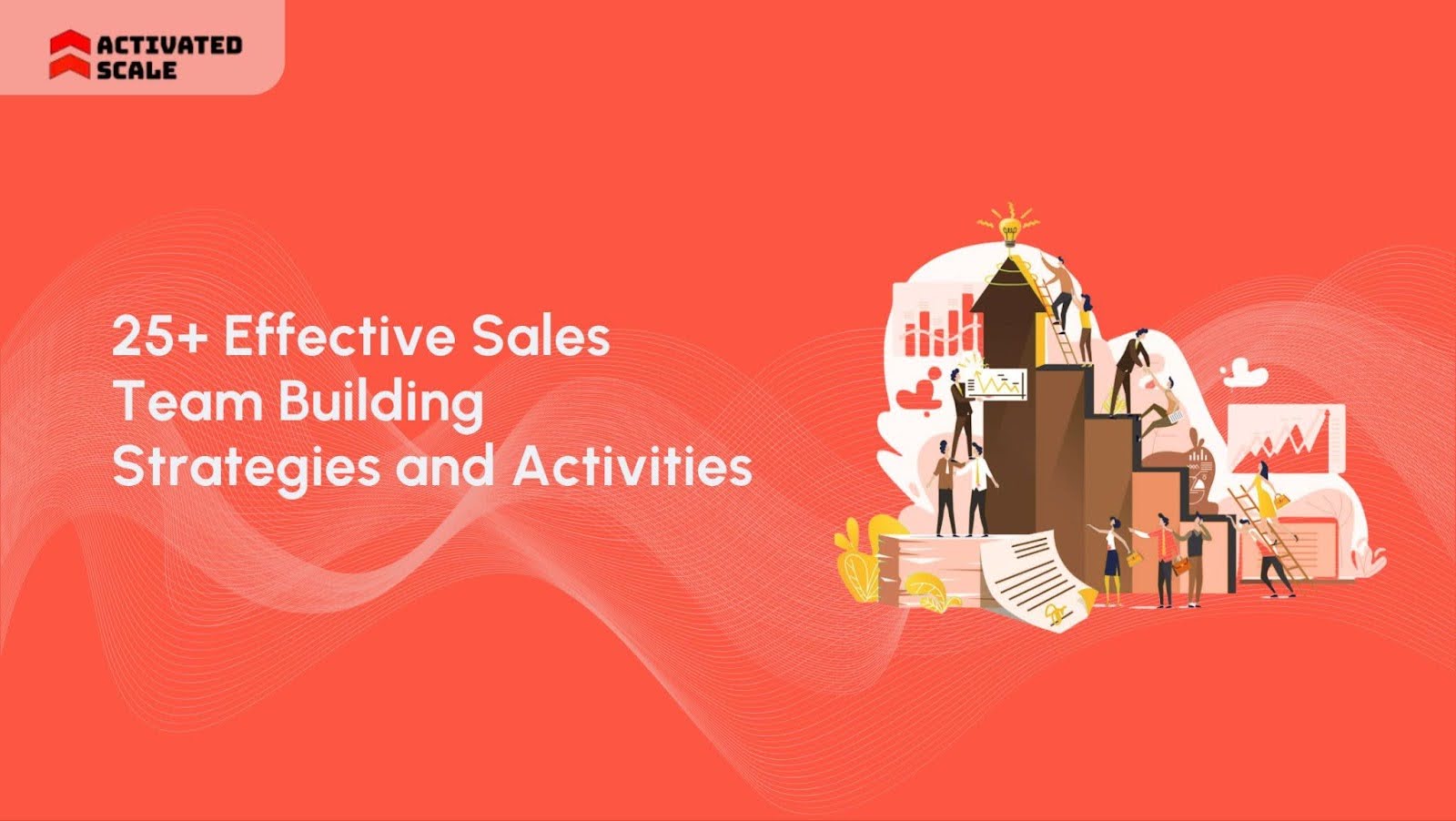Are you struggling to build a cohesive and high-performing contract-based sales team? If yes, then we get you. No one can deny the difficulty of aligning remote workers and driving consistent results.
In fact, only 8% of companies have a smooth alignment between sales and marketing. This challenge is even more pronounced when handling contract-based sales representatives. Since they work contractually, most of them are misaligned with the team's objective.
So, how will you ensure they are proactive in bringing success with the rest of your team?
In this blog, we’ll walk you through effective contract-based sales team-building strategies and activities. This will help you design to overcome these obstacles and boost your team’s engagement and performance.
TL;DR
- Contract-based sales teams face unique challenges such as high churn and limited bonding.
- Role-playing activities like objection handling and sales pitch face-offs are key to improving sales reps' skills.
- Virtual team-building activities, including escape rooms and gratitude walls, help combat isolation in remote settings.
- Peer learning practices such as pitch-off Fridays and coaching circles build trust and accountability.
- To effectively scale a contract-based sales team, combine team-building with strategic talent recruitment.
Why Contract-Based Sales Teams Need Team-Building Strategies?
Unlike full-time employees, contract sales teams often work remotely for 3-6 months on average. This makes cultural integration more challenging. So, with a short ramp-up time and high churn rates, it’s crucial to implement team-building strategies early on.
Otherwise, this can lead to inconsistent performance and a lack of accountability. It can cost businesses valuable time and resources. To avoid these, you need to know the proven strategies that can help you tackle real-world issues.
Also Read: How a BDR Playbook Fuels Startup Growth
20 Team-Building Activities for Building Contract Sales Teams
Given the temporary nature and remote work structure of many contract roles, traditional team-building methods often fall short. In this section, we’ll explore 20 proven activities to ensure your contract-based sales team feels supported.
Here’s a list of activities you should try:
A. Role-play and Sales Simulation Activities
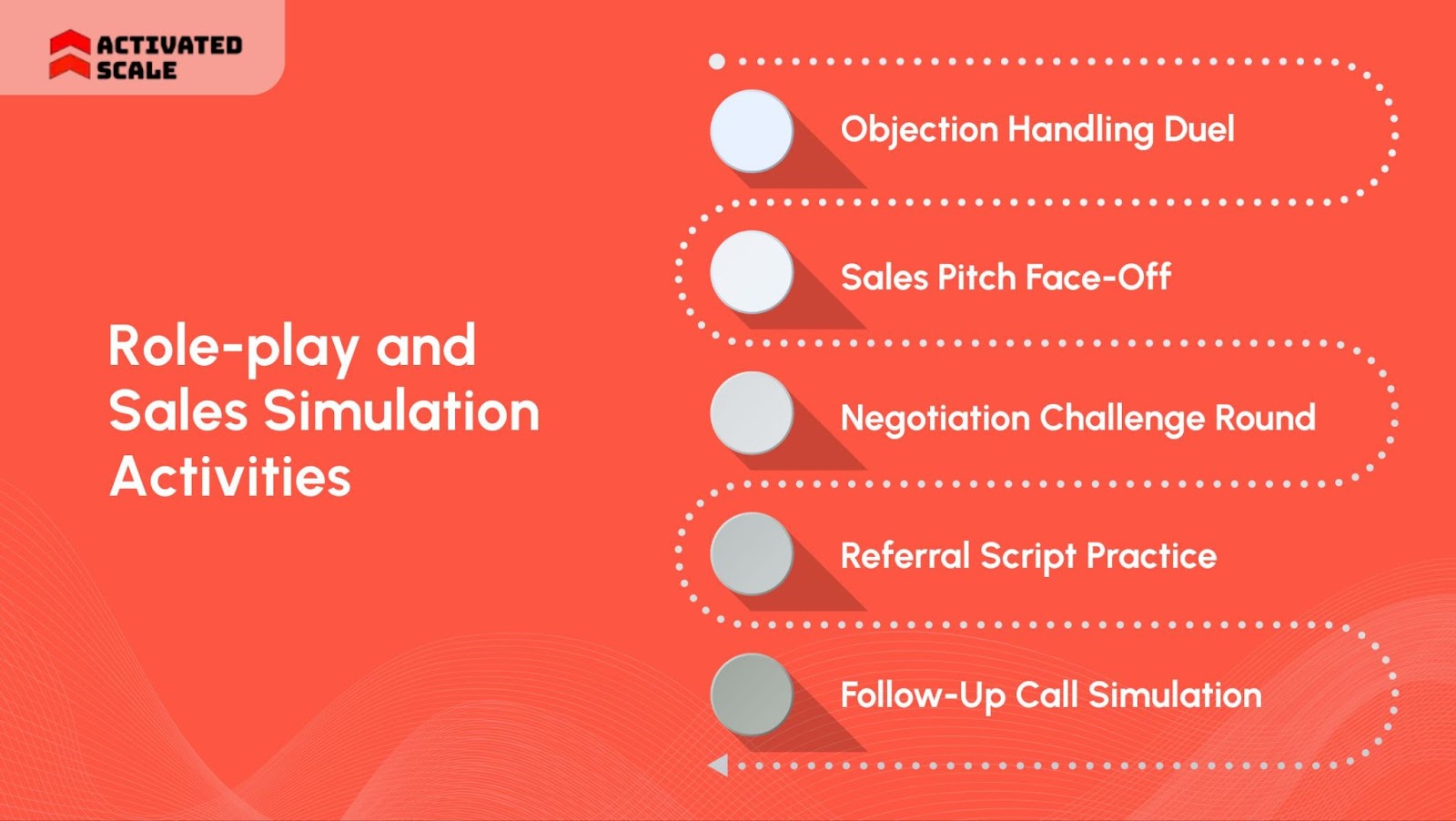
- Objection Handling Duel
- Duration: 20 minutes
- Outcomes:
- Sharpen objection-handling skills under pressure
- Build confidence in addressing real-world challenges
- Encourage quick thinking and adaptability
- Group Size: 2–4 reps
- Difficulty Level: Moderate
- Step-by-Step:
- One person plays the client, and another plays the sales rep.
- Provide three real-world objections for each role.
- Switch roles after each round.
- Afterward, debrief and discuss key takeaways to refine skills.
- Sales Pitch Face-Off
- Duration: 30–40 minutes
- Outcomes:
- Improve clarity and storytelling in pitch delivery
- Increase team members’ confidence in presenting to clients
- Promote friendly competition to enhance performance
- Group Size: Up to 6 per round
- Difficulty Level: Moderate
- Step-by-Step:
- Each rep delivers a 2-minute pitch to a fictional customer.
- The rest of the team votes anonymously on the strongest pitch.
- Winners explain the reasoning behind their pitch.
- Negotiation Challenge Round
- Duration: 25 minutes
- Outcomes:
- Develop effective negotiation techniques
- Increase confidence in high-stakes conversations
- Encourage strategic thinking under pressure
- Group Size: 2 per session
- Difficulty Level: High
- Step-by-Step:
- Assign each pair a deal card with a budget and limits.
- Each person negotiates for 10 minutes, focusing on maximizing their side’s benefits.
- Judges score based on strategy, execution, and negotiation tactics.
- Referral Script Practice
- Duration: 15 minutes
- Outcomes:
- Master the art of requesting referrals naturally
- Improve communication skills for building rapport
- Enhance customer retention through effective referral techniques
- Group Size: 2–3 reps
- Difficulty Level: Easy
- Step-by-Step:
- Choose common customer scenarios and role-play asking for referrals.
- Focus on adjusting tone and delivery for a natural, friendly request.
- Use peer feedback to refine and improve.
- Follow-Up Call Simulation
- Duration: 20 minutes
- Outcomes:
- Strengthen follow-up call effectiveness
- Improve the timing and structure of follow-up conversations
- Build stronger relationships through better call management
- Group Size: 2 reps
- Difficulty Level: Easy
- Step-by-Step:
- Reps' role-play follow-up calls with one taking the lead as the salesperson and the other acting as the prospect.
- Focus on making the conversation feel less scripted.
- Afterward, provide feedback on the pacing, tone, and overall approach.
Consider using Activated Scale’s Contract-to-Hire Sales Recruiting service. Our sourced professionals are capable of bringing success from the beginning of their employment.
B. Competitive Games and Recognition Rituals
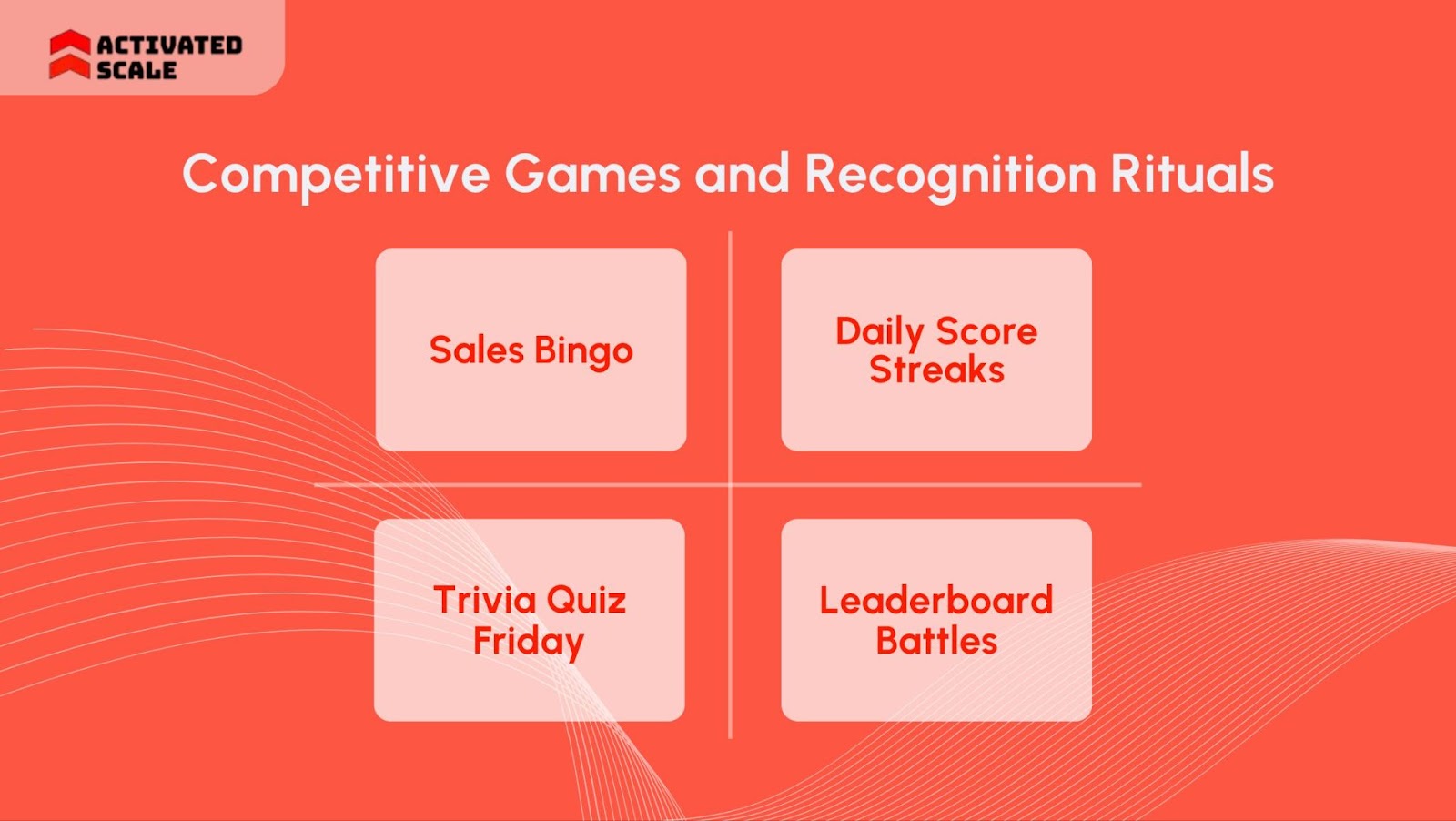
- Sales Bingo
- Duration: Ongoing (weekly grid)
- Outcomes:
- Gamify everyday sales tasks, like follow-ups and demos
- Create a fun, engaging atmosphere to boost motivation
- Encourage team collaboration through shared tasks
- Group Size: Whole team
- Difficulty Level: Easy
- Step-by-Step:
- Create bingo cards with sales-related tasks (e.g., schedule a demo, close a deal, etc.).
- Reps aim to complete a row or a full card.
- Post weekly updates in a shared space, such as Slack, to track progress and celebrate winners.
- Daily Score Streaks
- Duration: 10 minutes (end-of-day check)
- Outcomes:
- Boost consistency in sales activities
- Encourage healthy competition within the team
- Motivate reps to maintain a high level of productivity
- Group Size: Individual leaderboard
- Difficulty Level: Easy
- Step-by-Step:
- Tally daily streaks (calls, emails, meetings, etc.).
- Track and post streaks publicly at the end of each day.
- Reset the streaks weekly to keep the competition fresh and exciting.
- Trivia Quiz Friday
- Duration: 20 minutes
- Outcomes:
- Reinforce product knowledge and internal processes
- Keep reps engaged and improve recall under pressure
- Encourage learning in a low-pressure environment
- Group Size: Any size
- Difficulty Level: Easy
- Step-by-Step:
- Use tools like Kahoot or Google Forms to create a trivia quiz.
- Mix questions about product details, CRM usage, and company policies.
- Reward the fastest right answers with small prizes or public recognition.
- Leaderboard Battles
- Duration: Weekly (5–10 minutes to set up)
- Outcomes:
- Inspire productivity through visibility and friendly competition
- Motivate the team to aim for higher targets
- Increase engagement with weekly updates and rankings
- Group Size: All reps
- Difficulty Level: Easy
- Step-by-Step:
- Publish weekly rankings based on sales metrics (deals closed, meetings booked, etc.).
- Highlight the top performers and biggest movers.
- Provide public recognition and a reward system for top-ranking reps.
C. Remote or Virtual Team-Building Ideas
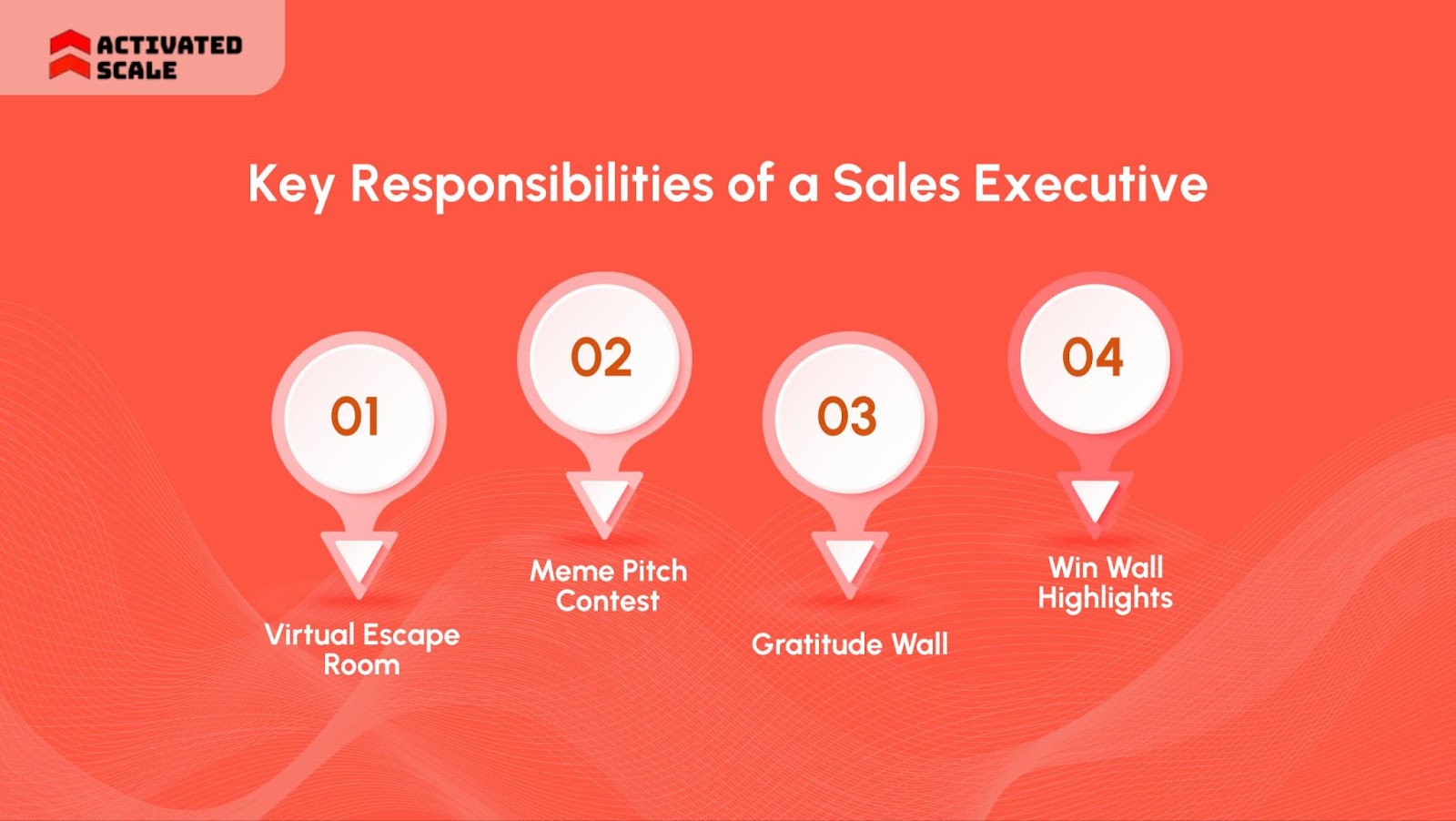
- Virtual Escape Room
- Duration: 45–60 minutes
- Outcomes:
- Enhance team collaboration and problem-solving skills
- Promote creativity and adaptability in high-pressure situations
- Strengthen communication and trust within the team
- Group Size: 3–6 per team
- Difficulty Level: Moderate
- Step-by-Step:
- Use virtual escape room platforms like Escapely or custom puzzle tools.
- Assign roles to team members and track the time to escape.
- Afterward, discuss what worked well and areas for improvement in terms of problem-solving.
- Meme Pitch Contest
- Duration: 20 minutes
- Outcomes:
- Encourage creativity in messaging and product positioning
- Promote a light-hearted, fun approach to sales conversations
- Promote team engagement through humor and creativity
- Group Size: Any
- Difficulty Level: Easy
- Step-by-Step:
- Ask each rep to create a meme pitching your product or service.
- The team votes on the funniest and most accurate meme.
- Provide feedback on how the meme effectively communicates the brand message.
- Gratitude Wall (Slack)
- Duration: 5 minutes daily/weekly
- Outcomes:
- Build a culture of appreciation and mutual respect
- Boost team morale by recognizing individual and team contributions
- Strengthen team cohesion through consistent positive reinforcement
- Group Size: Entire team
- Difficulty Level: Easy
- Step-by-Step:
- Each rep posts one thank-you or shoutout in a dedicated Slack channel.
- Managers pin the top posts each week for recognition.
- Encourage everyone to participate regularly to maintain a positive environment.
- Win Wall Highlights
- Duration: Weekly
- Outcomes:
- Reinforce a success-driven culture within the team
- Celebrate wins and milestones, no matter how small
- Keep the team motivated by highlighting individual and team accomplishments
- Group Size: Team-wide
- Difficulty Level: Easy
- Step-by-Step:
- Team members share their wins in a dedicated channel, including client names and what worked.
- Add fun elements like emojis or GIFs to keep it engaging.
- Managers highlight the biggest wins in weekly meetings.
D. Physical/Outdoor Activities (for Hybrid or Local Teams)
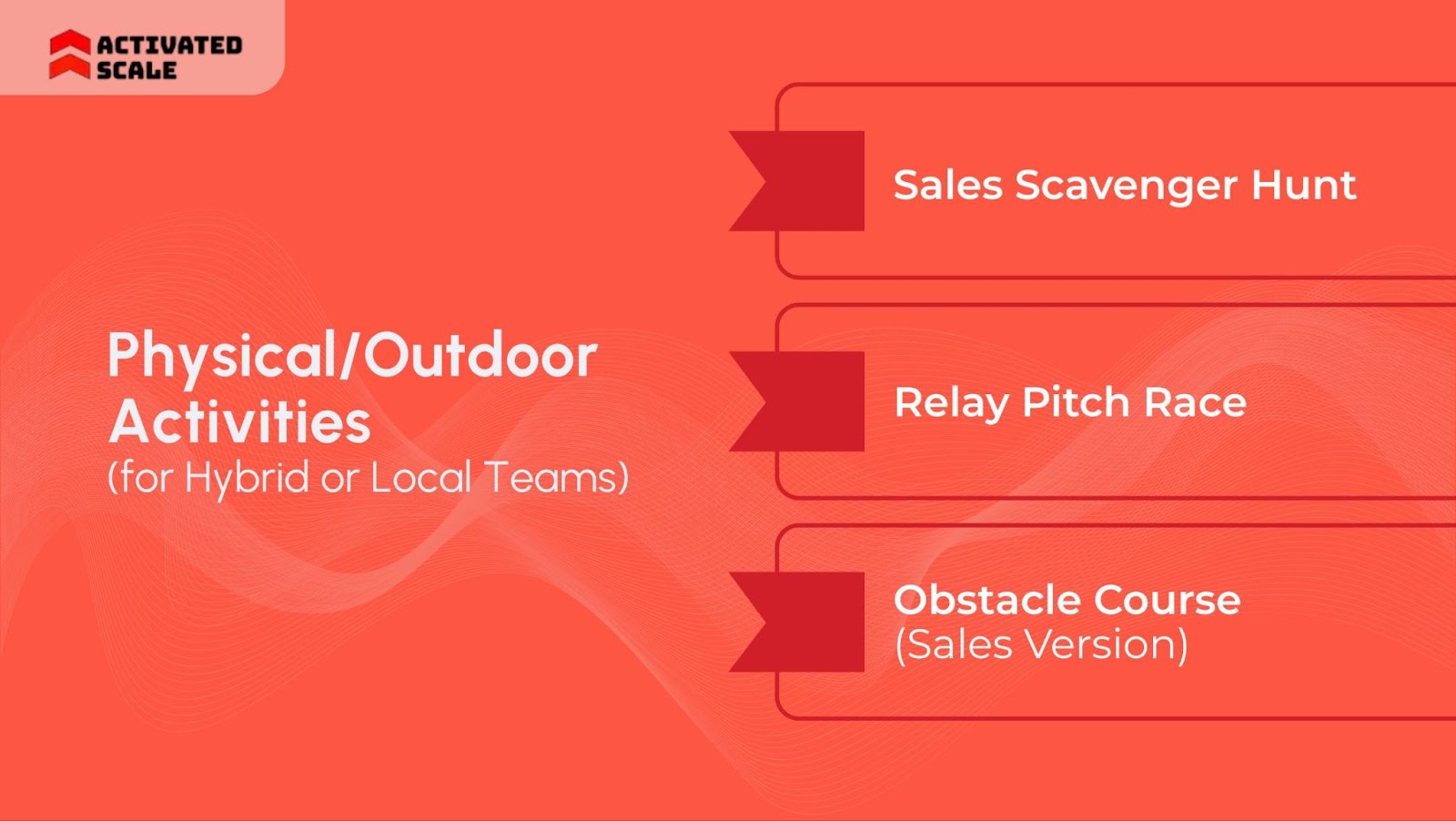
- Sales Scavenger Hunt
- Duration: 60–90 minutes
- Outcomes:
- Promote teamwork and communication in an outdoor setting
- Increase local territory awareness and product knowledge
- Encourage creative problem-solving while having fun
- Group Size: Teams of 2–3
- Difficulty Level: Moderate
- Step-by-Step:
- Create a checklist of landmarks, partner stores, or sales-related tasks.
- Teams take photos or collect items as proof.
- Share results in a group debrief to discuss strategies and lessons learned.
- Relay Pitch Race
- Duration: 30–40 minutes
- Outcomes:
- Practice smooth hand-offs and pitch sequencing
- Encourage teamwork by dividing the pitch into parts
- Improve sales reps’ ability to deliver cohesive, well-timed pitches
- Group Size: 3–5 per team
- Difficulty Level: Moderate
- Step-by-Step:
- Each person in the team handles a part of the sales pitch (e.g., hook, benefits, closing).
- Time the complete run-through and measure how well each part flows.
- Discuss the outcome and refine the pitch for better cohesion.
- Obstacle Course (Sales Version)
- Duration: 1 hour
- Outcomes:
- Build physical and mental teamwork
- Encourage resilience and quick thinking under pressure
- Improve collaboration and coordination among team members
- Group Size: Pairs or trios
- Difficulty Level: High
- Step-by-Step:
- Create an obstacle course with various stations (e.g., mock cold calls, proposal assembly, product trivia).
- Teams must complete tasks at each station before moving to the next.
- Track completion times and discuss strategies for overcoming challenges.
Activate your team’s potential with the Fractional Selling service by Activated Scale. Our U.S.-based sales talents ensure every rep is working toward the same goals, on and off the field.
E. Peer Learning & Collaboration Habits
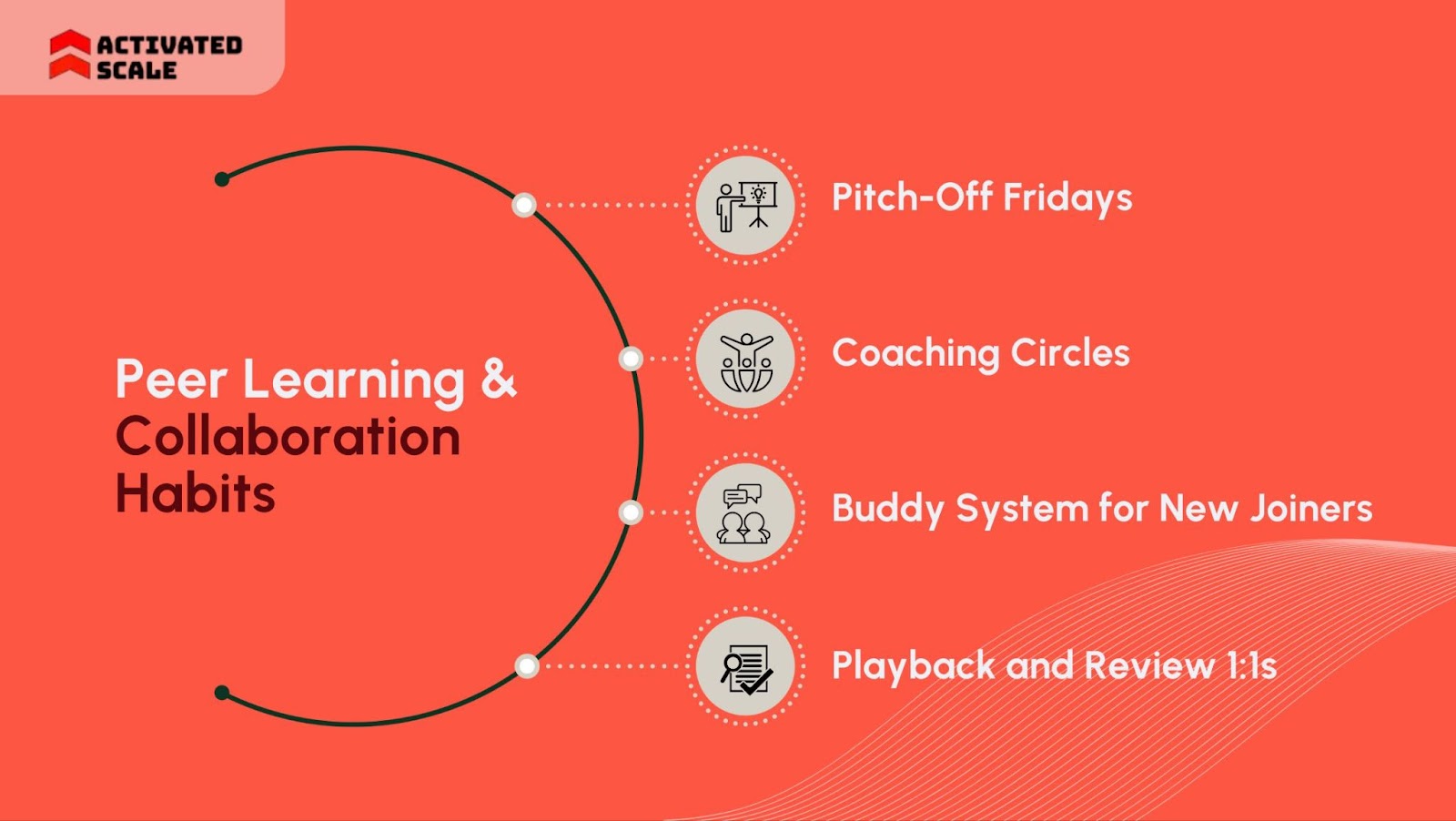
- Pitch-Off Fridays
- Duration: 30 minutes
- Outcomes:
- Improve internal presentation and pitch delivery
- Increase confidence in presenting to both peers and clients
- Encourage a culture of constructive feedback
- Group Size: 4–6 per session
- Difficulty Level: Easy
- Step-by-Step:
- Each rep presents a 2-minute pitch.
- Peers give instant feedback on confidence, clarity, and ability to close.
- Encourage specific feedback to help each rep refine their pitch.
- Coaching Circles
- Duration: Weekly, 45 minutes
- Outcomes:
- Enhance knowledge-sharing and accountability among peers
- Provide a safe space for discussing struggles and solutions
- Strengthen team communication and trust
- Group Size: 4–5 reps
- Difficulty Level: Moderate
- Step-by-Step:
- Choose a specific topic each week (e.g., follow-ups, objection handling).
- Each rep shares one tip they’ve learned and one struggle they’re facing.
- Encourage active discussion and collaborative problem-solving.
- Buddy System for New Joiners
- Duration: Ongoing
- Outcomes:
- Reduce ramp-up time for new hires
- Build early connections and integration within the team
- Enhance retention by providing support during the transition phase
- Group Size: Pairs
- Difficulty Level: Easy
- Step-by-Step:
- Assign each new rep a buddy for the first two weeks.
- Create a checklist of key areas to cover (e.g., product knowledge, CRM processes).
- Encourage regular check-ins and feedback sessions between the new rep and their buddy.
- Playback and Review 1:1s
- Duration: 20 minutes per session
- Outcomes:
- Provide personalized feedback and improvement opportunities
- Build self-awareness and promote continuous improvement
- Encourage accountability and self-reflection
- Group Size: Rep and manager
- Difficulty Level: Easy
- Step-by-Step:
- Each week, pick one sales call or demo for playback.
- Review the call together, with the manager offering feedback on key areas like pitch, handling objections, and closing.
- Reps reflect on their performance and set specific goals for improvement.
When contract-based sales teams feel supported and connected, they’re more likely to drive sustained success. In this way, you'll create a culture that helps reps perform at their best.
Also Read: Navigating the Seven Stages of Business Growth: A Guide
While activities help build trust and engagement, they’re only one part of the equation. For sustained performance in contract-based sales teams, you need structured strategies that shape how the team is formed.
7 Contract-based Sales Team-building Strategies
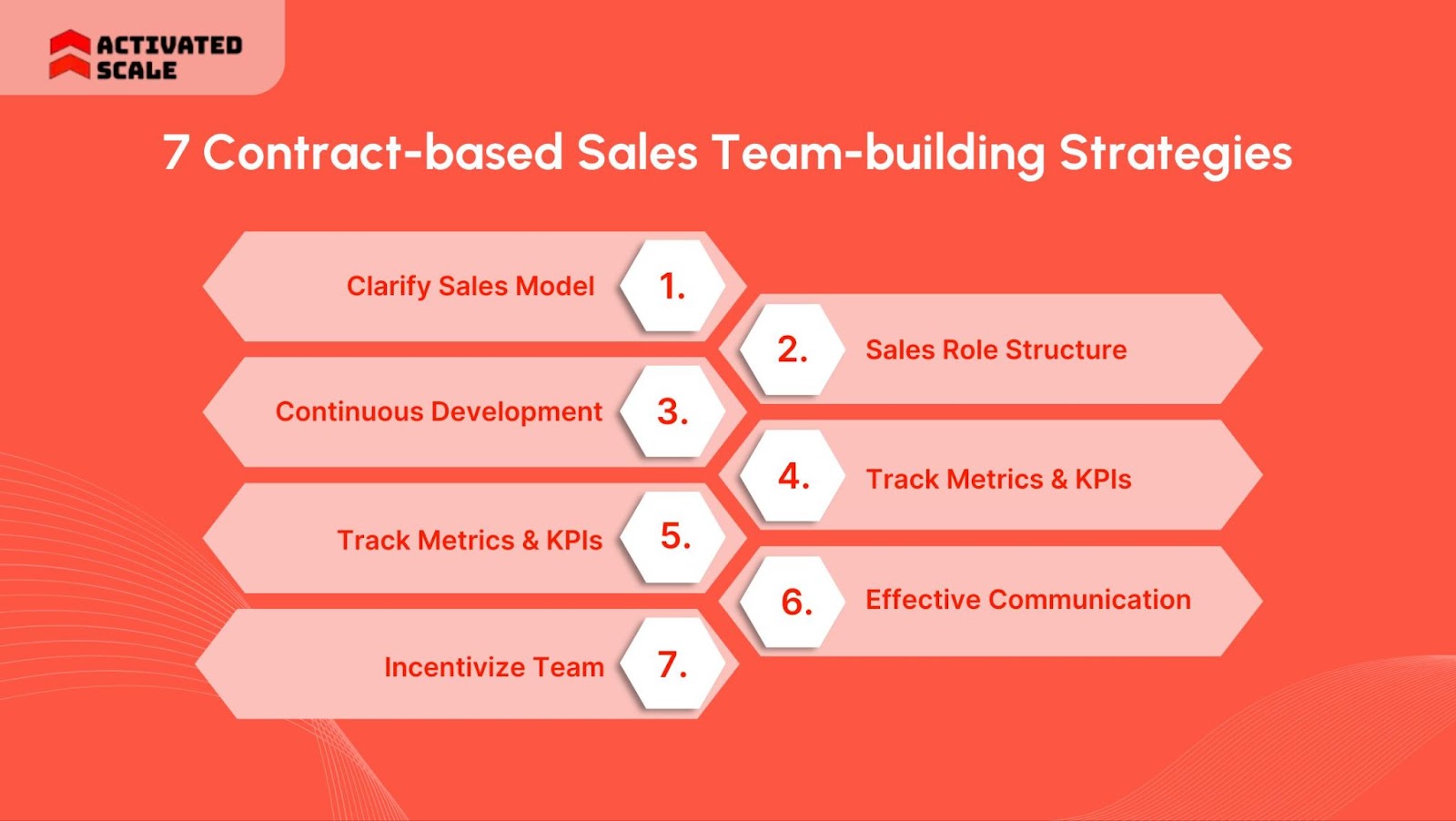
Unlike full-time teams, contract-based teams face unique challenges such as limited context and variable commitment levels. The following strategies help you overcome those constraints and build a high-performing sales team:
Step 1: Clarify Your Sales Model
Understanding your sales model is the foundation for building a contract-based team. It helps you determine how leads are acquired and what success looks like. This clarity ensures every member knows their focus.
- Break down your offer and map how it's sold in different regions or buyer segments.
- Document the typical sales motion, from outreach to conversion, highlighting who owns which stage.
- Identify what can be outsourced or assigned to contract-based reps (e.g., prospecting, demos, renewals).
- Use this model to guide decisions around team structure, tools, and performance expectations.
Step 2: Develop a Sales Team Role Structure
Clearly defining roles helps contract-based reps stay accountable and reduces task overlap. It also allows you to hire for specific responsibilities like lead generation, closing, or account management, etc.
- Create role categories like sales development reps (SDRs) for outbound, account executives (AEs) for closing, etc.
- Assign ownership of each sales stage to a role, ensuring no two people own the same outcome.
- Document role expectations, daily tasks, and performance metrics in a shared playbook.
- Align compensation and incentives with each role’s responsibilities and impact.
Ready to create a structured contract-based sales team? Take advantage of Activated Scale’s Fractional Selling service, where you can hire an SDR or AE on a monthly retainer.
Step 3: Encourage Continuous Professional Development
Even contract reps need growth opportunities. Ongoing skill development ensures your team stays updated on product changes and market dynamics.
- Offer micro-training modules on tools, messaging, and negotiation skills weekly or bi-weekly.
- Invite external trainers for short sessions on buyer psychology, objection handling, etc.
- Encourage peer-to-peer learning via deal debriefs and knowledge-sharing huddles.
- Track who completes which training and correlate it with performance growth.
Step 4: Track Metrics and KPIs
You can’t improve what you don’t measure. For contract-based teams, tracking the right key performance indicators (KPIs) helps identify top performers and ensure their accountability.
- Monitor key metrics like conversion rate, lead response time, and sales velocity.
- Build dashboards accessible to both managers and reps to boost transparency.
- Review performance in weekly check-ins and adjust tactics if needed.
- Use KPIs to drive data-backed coaching, not just reporting.
Step 5: Build Trust With Your Team
Trust is the foundation of any successful sales team. Build credibility through transparency, consistency, and respect.
- Start every contract with a clear scope, expectations, and performance benchmarks.
- Give regular, constructive feedback, both wins and areas for growth.
- Involve reps in strategy discussions to make them feel valued.
- Avoid micromanagement; trust them to deliver while offering support when needed.
Step 6: Use Effective Communication Skills
Contract-based teams often operate remotely or asynchronously. You need clear, intentional communication habits to prevent friction and delay.
- Set fixed syncs for pipeline reviews, 1:1s, and deal huddles.
- Use async tools (Loom, Slack, Notion) for updates and documentation.
- Standardize channels, avoid mixing tools for the same purpose.
- Share deal wins and feedback publicly to maintain team morale.
Step 7: Incentivize Your Team
Incentives drive results, but they must be customized for contractors. Make rewards timely, tied to impact, and aligned with your goals.
- Offer spot bonuses for surpassing lead targets or demo completions.
- Share leaderboards and recognize top performers weekly or monthly.
- Introduce tiered reward systems that evolve with experience or tenure.
- Make incentives predictable, not arbitrary, as clarity builds trust.
Strong strategies make short-term teams work like long-term assets. With the right support, your contract-based sales team can deliver results fast.
Read Also: Building a Sales Strategy for Startups
Conclusion
The strategies discussed here offer clear ways to engage your team and maintain high-performance levels. Effective contract-based sales team-building strategies should create a lasting impact on team morale.
The key to success lies in using these techniques consistently, ensuring that your team achieves the expected outcome.
If you're looking to take the next step and build a more capable, high-performing contract sales team, book a call with us. Activated Scale can provide expert support in creating effective sales processes.
FAQs
1. What’s the main difference between building a full-time and contract-based sales team?
Contract-based teams need faster onboarding, clear short-term goals, and lightweight processes since they often work on tighter timelines. Unlike full-time teams, they aren’t always integrated into company culture.
So your focus should be on aligning them to outcomes, not long-term development. Training, tools, and communication should all be geared toward immediate execution and accountability.
2. How long should team-building take for contract sales reps?
You should see alignment within the first 2 weeks. Use structured activities and goal-setting to speed up collaboration.
3. Do team-building strategies really work for short-term or project-based sales teams?
Yes. Even simple role-plays, shared dashboards, or check-ins can boost cohesion and performance within weeks.
4. What’s the biggest mistake to avoid when managing contract-based sales teams?
Avoid unclear roles or vague expectations. Without defined goals, short-term reps lose focus and underperform quickly.
The Ultimate Guide to Hiring a Salesperson!
Get the step-by-step guide to hiring, onboarding, and ensuring success!
_edi.png)
